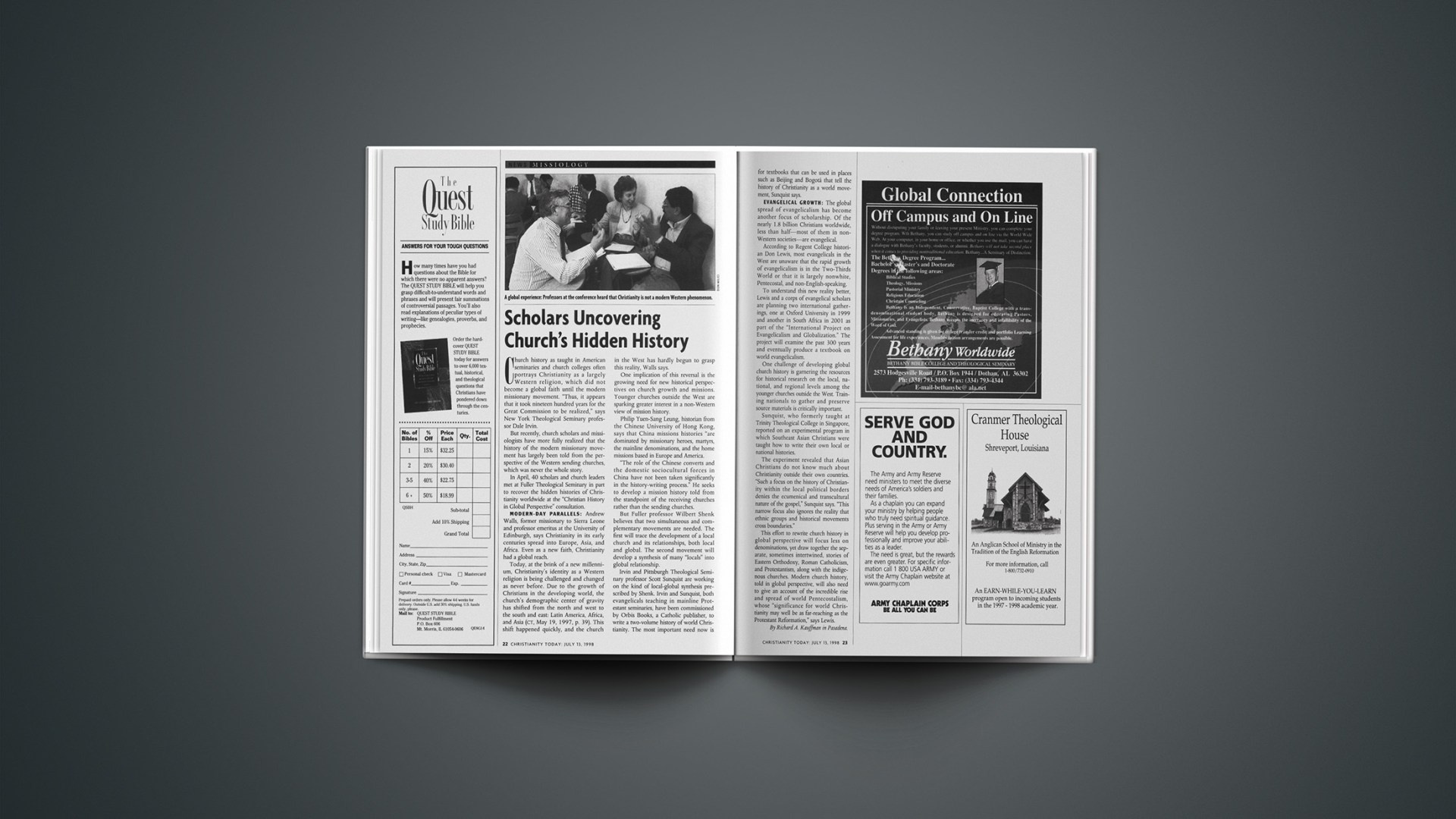Church history as taught in American seminaries and church colleges often portrays Christianity as a largely Western religion, which did not become a global faith until the modern missionary movement. “Thus, it appears that it took nineteen hundred years for the Great Commission to be realized,” says New York Theological Seminary professor Dale Irvin.
But recently, church scholars and missiologists have more fully realized that the history of the modern missionary movement has largely been told from the perspective of the Western sending churches, which was never the whole story.
In April, 40 scholars and church leaders met at Fuller Theological Seminary in part to recover the hidden histories of Christianity worldwide at the “Christian History in Global Perspective” consultation.
MODERN-DAY PARALLELS: Andrew Walls, former missionary to Sierra Leone and professor emeritus at the University of Edinburgh, says Christianity in its early centuries spread into Europe, Asia, and Africa. Even as a new faith, Christianity had a global reach.
Today, at the brink of a new millennium, Christianity’s identity as a Western religion is being challenged and changed as never before. Due to the growth of Christians in the developing world, the church’s demographic center of gravity has shifted from the north and west to the south and east: Latin America, Africa, and Asia (CT, May 19, 1997, p. 38). This shift happened quickly, and the church in the West has hardly begun to grasp this reality, Walls says.
One implication of this reversal is the growing need for new historical perspectives on church growth and missions. Younger churches outside the West are sparking greater interest in a non-Western view of mission history.
Philip Yuen-Sang Leung, historian from the Chinese University of Hong Kong, says that China missions histories “are dominated by missionary heroes, martyrs, the mainline denominations, and the home missions based in Europe and America.
“The role of the Chinese converts and the domestic sociocultural forces in China have not been taken significantly in the history-writing process.” He seeks to develop a mission history told from the standpoint of the receiving churches rather than the sending churches.
But Fuller professor Wilbert Shenk believes that two simultaneous and complementary movements are needed. The first will trace the development of a local church and its relationships, both local and global. The second movement will develop a synthesis of many “locals” into global relationship.
Irvin and Pittsburgh Theological Seminary professor Scott Sunquist are working on the kind of local-global synthesis prescribed by Shenk. Irvin and Sunquist, both evangelicals teaching in mainline Protestant seminaries, have been commissioned by Orbis Books, a Catholic publisher, to write a two-volume history of world Christianity. The most important need now is for textbooks that can be used in places such as Beijing and Bogot that tell the history of Christianity as a world movement, Sunquist says.
EVANGELICAL GROWTH: The global spread of evangelicalism has become another focus of scholarship. Of the nearly 1.8 billion Christians worldwide, more than half—most of them in non-Western societies—are evangelical.
According to Regent College historian Don Lewis, most evangelicals in the West are unaware that the rapid growth of evangelicalism is in the Two-Thirds World or that it is largely nonwhite, Pentecostal, and non-English-speaking.
To understand this new reality better, Lewis and a corps of evangelical scholars are planning two international gatherings, one at Oxford University in 1999 and another in South Africa in 2001 as part of the “International Project on Evangelicalism and Globalization.” The project will examine the past 300 years and eventually produce a textbook on world evangelicalism.
One challenge of developing global church history is garnering the resources for historical research on the local, national, and regional levels among the younger churches outside the West. Training nationals to gather and preserve source materials is critically important.
Sunquist, who formerly taught at Trinity Theological College in Singapore, reported on an experimental program in which Southeast Asian Christians were told how to write their own local or national histories.
The experiment revealed that Asian Christians do not know much about Christianity outside their own countries. “Such a focus on the history of Christianity within the local political borders denies the ecumenical and transcultural nature of the gospel,” Sunquist says. “This narrow focus also ignores the reality that ethnic groups and historical movements cross boundaries.”
This effort to rewrite church history in global perspective will focus less on denominations, yet draw together the separate, sometimes intertwined, stories of Eastern Orthodoxy, Roman Catholicism, and Protestantism, along with the indigenous churches. Modern church history, told in global perspective, will also need to give an account of the incredible rise and spread of world Pentecostalism, whose “significance for world Christianity may well be as far-reaching as the Protestant Reformation,” says Lewis.
Copyright © 1998 Christianity Today. Click for reprint information.










